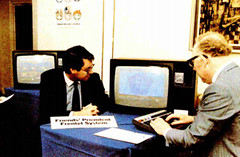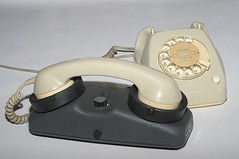
It's funny when you find yourself as (pretty much) the sole guardian of a part of history. It doesn't happen very often now as Google is so great at getting (most) information and keeping it safe, but as my life predates home computers (by a good number of years), let alone the internet as we now know it, I find there to be things that I remember that no-one else has documented online (at all) and increasingly any other minds with similar engrams will stop firing and be placed reverently underground or reduced to ashes (before we learn to CRISPR them into immortality or digitise them).
This isn't any attempt at profundity. It's just that there are things that are unexpectedly in danger of being completely forgotten to humanity (and I don't like that sort of thing very much). Now - and this isn't even in the same universe, let alone ball park, but wondering how the pyramids were built is irritatingly futile, and this was a society that did write things down - a lot - (albeit on bits of stone) - we've moved firmly on now, but oh boy is there a consciousness gap.
Anyway, power up your Wayback machines (apologies if they are feeling a bit worn out) - set them for when I started working at Friends Provident - things were (just about) in technicolor, but there was no email yet (even internal "email" was yet to arrive in the form of MEMO), people still had ashtrays on their desks, a few people were still filling out and carefully stacking punch-cards, all the documents for each insurance policy/case were on paper and stored in a big warehouse in Milford (near Salisbury)...there was a computer, just the one. A big old IBM mainframe (3090?) that mostly just ran a system called GLADIS (General Life Assurance Database Information System - (I think) it was something very close to that anyway) via an insane spaghetti of coax cables out to thousands of dumb terminals - and a few other specialised systems like CA ROSCOE (Urm...Remote OS Conversational Operating Environment?) which was a sort of scripting environment in a clunky text editor, you could write little executables if you could put up with it, some people even wrote little games, there was a Rogue-a-like and a version of the old Star Trek game, ROSCOE was the playground which you also used to do big database queries or fire off millions of mail-merged letters through the car sized line/page printers. If you had a good enough terminal (i.e. better than 3270) you could run TPX and have everything in teeny weeny fonts (that was 7337)...before we knew it was.
Anyway, just as the first laptops became available (sewing machine sized) Friends Provident did something so revolutionary that they ended up getting a slot on the BBC TV Show "Tomorrows World".

For the time it was staggeringly forward thinking. Basically, the IFA (Independent Financial Advisor) or a branch sales guy would lug the "laptop" or a similar terminal system (ahem) and a huge great accoustic coupler-

-round to people's houses, presumably unplug everything in the potential clients living room - connect their old-school BT Buzby telephone handset up to the accoustic coupler and use a 300 baud (read very slow) modem to dial up to this system called "FRENTEL" (so I guess in most cases the sales process took place on the floor by the front door where point zero tended to be). It looked a bit like teletext when it was working, but it interfaced direct with good old GLADIS and allowed the sales guys to produce quotes (and print them off on old daisy wheel printers if they could be bothered to lug them into the hall as well) right there and then in the policy holder's home.
THAT WAS AMAZING!
Now...as far as I can see, there is only one document regarding the whole incredible thing on the entire internet about it...this single PDF.
So I guess my point isn't really that FRENTEL existed, it's that now (after having spoken about it a little bit) there are two bits of evidence that it ever did so in the first place.
I hope there aren't too many things I am now responsible for remembering for humanity - FRENTEL is over to you now Google.
No comments:
Post a Comment